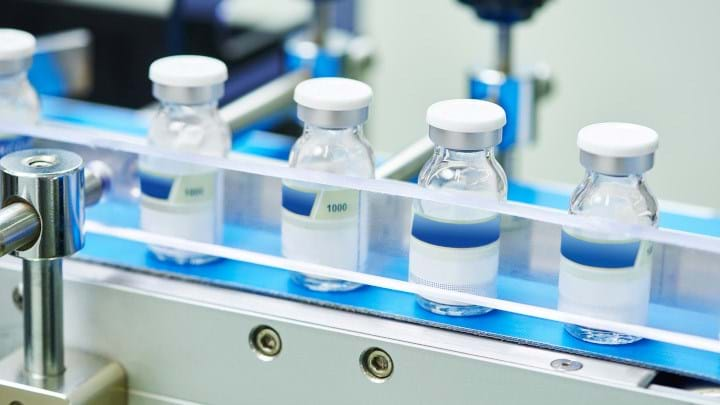IChemE can help to increase availability of Covid-19 treatment drugs

THE IChemE Covid-19 Response Team is supporting efforts to increase the availability of drugs that can help treat the disease and make it less deadly. Preventative vaccines are not expected to be widely available before 2021, making small-molecule drugs important for treating the disease in the meantime.
The coronavirus pandemic has prompted a global effort to repurpose existing approved drugs to treat the disease. In addition to identifying these life-saving drugs, their availability in the required quantities has to be ensured. The IChemE response team, in partnership with the International Society for Pharmaceutical Engineering (ISPE) UK Affiliate, has been working to support the establishment of a robust supply chain that can produce the required dosages. ISPE is the world’s largest not-for-profit association serving members by leading scientific, technical, and regulatory advancement throughout the entire pharmaceutical lifecycle.
Many companies that develop or hold licences for small molecule drugs do not have their own manufacturing facilities, and outsource production to contract manufacturers. Small-molecule drugs are low molecular weight compounds that target and affect a specific biological process, for example to treat disease. Due to current demand for contract manufacturing, capacity is limited, and pharmaceutical companies are struggling to ramp up production. To address this obstacle in the supply chain, the response team sought to identify spare capacity in manufacturing facilities.
Many small-molecule medicines, or their intermediates, are produced in Asia. The current pandemic has exacerbated an already-pressurised supply chain, leading companies with already-approved drugs to ask industry for help.
In an open letter, Gilead CEO Daniel O’Day asked for manufacturing help to meet demand. Gilead developed the investigational antiviral drug remdesivir, which has been granted “exceptional” approval for coronavirus treatment in Japan and is currently authorised for limited use in North America, Europe, and the UK. On 1 June, Gilead announced the results of Phase III trials of remdesivir which showed that patients who received a 5-day treatment course were 65% more likely to show clinical improvement at Day 11 compared to those receiving standard care.
A shorter treatment course is beneficial for many reasons; patients can be discharged from hospital earlier; families can be reunited, and healthcare resources are freed up.
Responding to Gilead’s call, the IChemE team rapidly identified manufacturing partners who have capacity in the relevant production methods. The team then supplied Gilead with information regarding companies with spare manufacturing capacity. Gilead said it would follow up with the companies directly.
By linking pharmaceutical companies with partners that have spare manufacturing capacity, the team hopes to help industry ramp up production of vital treatment drugs.
Keith Plumb, IChemE Trustee and member of the IChemE Covid-19 Response Team, said: “Even when vaccines are available, it is going to take a significant amount of time to ramp up production to the amounts required, as to be successful the whole population will need to receive the vaccine. Small-molecule medicines can potentially make the disease much less lethal, and because we only need to treat infected patients, we need much smaller quantities.
“This means it is much easier to produce the quantities needed in the short term, and treatments can be administered to patients within months of linking up the drug companies and the manufacturers.”
It is hoped that widespread use of treatment drugs will reduce bring the lethality of Covid-19 down to manageable levels and reduce the impact on healthcare systems. Recently, the inexpensive and widely-available steroid treatment drug dexamethasone was shown to reduce deaths in patients hospitalised with severe respiratory complications caused by Covid-19. In the dexamethasone arm of a randomised trial for Covid-19 treatment, the drug reduced deaths by one-third in ventilated patients and by one fifth in other patients receiving oxygen only.
Connecting pharmaceutical companies with manufacturers that can contribute spare capacity is just one of several projects that IChemE’s Covid-19 team is working on. The team is focussing on a number of specific workstreams reflecting areas of chemical engineering expertise in the manufacture of small-molecule and biological medicines. Additionally, it is extending to cover diagnostics and hospital service requirements including medical gases and personal protective equipment.
IChemE’s Covid-19 Response Team consists of more than 70 volunteers from across the Institution’s membership that have expertise in pharmaceutical process scaleup, design and manufacturing, project management, facilities build and antibody therapeutics. It is currently working on several projects.
To ensure a resilient pharmaceutical manufacturing industry is in place for the future, IChemE has been working with industry stakeholders across its global network developing recommendations and advice for government bodies and industry associations.
Companies wishing to contribute spare capacity in the small molecules supply chain can e-mail the IChemE Response team.
Recent Editions
Catch up on the latest news, views and jobs from The Chemical Engineer. Below are the four latest issues. View a wider selection of the archive from within the Magazine section of this site.




